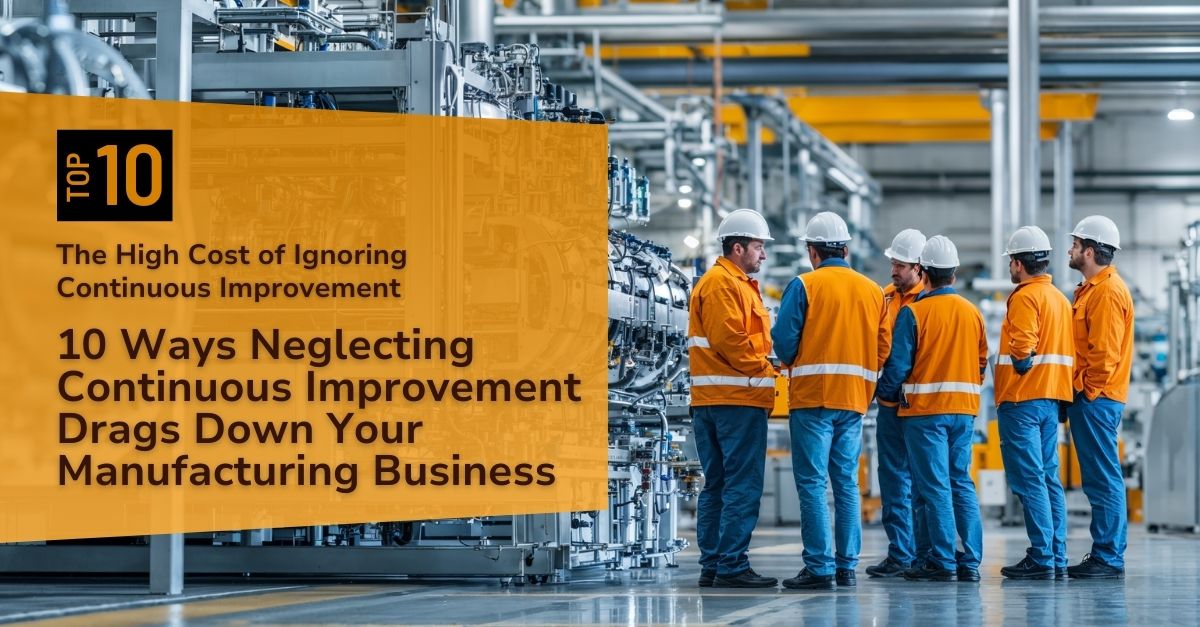
In today’s manufacturing environment, change is the norm, not the exception. New equipment, digital upgrades, customer expectations, supply chain shifts, everything moves fast. And while senior leaders might approve the changes, it’s the frontline who actually brings them to life.
That’s why frontline supervisors and managers need more than just operational knowledge. They need the tools and training to lead change. Without that, even the best-designed improvements stall on the shop floor.
Change management in manufacturing isn’t about rigid playbooks or academic models. It’s about clear communication, proactive support, and structured follow-through. It’s about making sure new processes, tools, and expectations are adopted fully, not halfway.
When you invest in helping your frontline lead change, not just react to it, you accelerate adoption, reduce downtime, and protect your margins.
Here are the top 10 gains you unlock when frontline leaders are equipped to drive change effectively:
1Seamless Process Integration:
Every new system, method, or procedure comes with a learning curve. But when frontline supervisors are involved early and understand both the why and the how, they guide their teams through the transition step-by-step. That minimizes slowdowns, limits errors, and keeps your production cadence steady.
2Reduced Resistance to New Technologies:
Operators aren’t afraid of technology, they’re afraid of being left behind. Frontline managers who can explain benefits clearly, coach through the learning curve, and create space for feedback reduce fear and resistance. That means faster, smoother rollouts and better returns on your tech investments.
3Optimized Resource Allocation:
Change often demands more of your people, time, and tools. A skilled frontline leader anticipates these shifting needs, whether that’s rotating crews, adjusting scheduling, or allocating more time to training, and moves resources where they’ll have the most impact. That ensures you keep moving even when the game plan shifts.
4Enhanced Employee Morale:
Change handled poorly drains your people. It creates confusion, doubt, and extra work. But change handled well, through clear direction, honest communication, and visible support, can actually strengthen team morale. Frontline leaders set the tone. When they’re steady, the team stays steady.
5Shorter Adjustment Periods:
When changes are clear, supported, and reinforced daily, teams adjust quicker. Frontline leaders who are coached in change management can diagnose where people are struggling, provide hands-on help, and remove small roadblocks before they become big ones. That gets your operation back to full speed faster.
6Cost Savings:
Mismanaged change is expensive, missed targets, inefficient use of labor, material waste, unnecessary overtime. But a proactive frontline leader helps prevent rework, catches issues early, and aligns their team’s actions with the new standard. That kind of control creates real financial impact.
7Greater Flexibility and Adaptability:
It’s not just about surviving this change, it’s about being ready for the next one. When frontline leaders know how to lead through uncertainty, they help their teams stay adaptable. That means fewer disruptions when market conditions shift or unexpected challenges arise.
8Improved Quality Control:
Even small process updates can throw off quality. But when frontline managers lead with a plan, they help teams preserve, and even enhance, quality standards through change. Whether it’s retraining, spot checks, or coaching through mistakes, strong change leadership keeps defects from creeping in.
9Risk Mitigation:
Every transition introduces risk, missed safety steps, skipped procedures, incorrect setups. Trained leaders help teams slow down when needed, escalate issues early, and follow the right checks as they adjust. That protects people, equipment, and production uptime.
10Strengthened Stakeholder Trust:
When change is smooth, people notice. Employees feel more confident. Customers see consistency. Executives see results. Suppliers get clarity. It all adds up to trust, and frontline managers are the ones who deliver that trust every day through how they lead during change.
Conclusions for Senior Leaders
The frontline is where change succeeds, or fails. When your supervisors are only told what’s changing, but not how to lead through it, you risk delays, confusion, and missed performance targets.
But when you give your frontline leaders the structure, skills, and coaching to manage change proactively, you gain something far more valuable: sustainable results.
This isn’t just a soft skill, it’s a hard-edge performance tool. Investing in change-ready frontline leadership helps you stay agile, protect throughput, and execute with confidence, no matter what’s coming next.
The POWERS Difference
At POWERS, we help manufacturers convert disruption into productivity. We work directly with plant leaders and frontline supervisors to embed strong change management skills into the daily flow of operations, not as an add-on, but as a core leadership behavior.
One of the critical areas in which we enhance productivity is our focus on frontline leadership development.
Our approach combines hands-on coaching, practical tools, and our DPS productivity platform to help your team hardwire new behaviors, processes, and technologies into the rhythm of execution.
Our approach combines hands-on coaching, practical tools, and our DPS productivity platform to help your team hardwire new behaviors, processes, and technologies into the rhythm of execution.
We don’t just help you launch change, we help you make it stick.
To put our experienced team and proven track record to work for you, schedule an initial discovery and analysis by calling +1 678-971-4711 or emailing us at info@thepowerscompany.com.
Continue Reading from this Mastery Series
- Part 1 - Strategic Alignment that Bridges Daily Tasks with Broader Visions for Unified Organizational Success
- Part 2 - Crafting Clarity through Effective Communication and Active Listening
- Part 3 - Sharpening Decision-Making Prowess for Seamless Operations and Minimal Downtimes
- Part 4 - Championing Lean Principles for Streamlined Success and an Ever-Evolving Workplace
- Part 5 - Mastering Performance Management for Optimal Team Output and Growth
- Part 6 - How Leaders Well-Trained in the Soft Skills Transform Manufacturing Teams
- Part 7 - Strengthening Conflict Resolution Skills for Peak Productivity and Profitability Gains
- Part 8 - Unleashing Potential with Precision Time and Resource Management
- Part 9 - Safety First for Sustainable And Scalable Productivity And Profitability
- Part 10 - Equipping Your Shop Floor Leaders to Be Effective Change Managers







